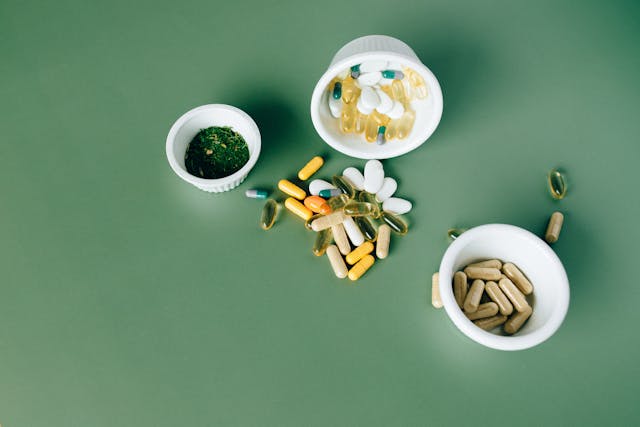Collagen is often hailed as the “glue” that holds your body together—and for good reason. This essential protein plays a vital role in maintaining skin elasticity, joint health, and overall well-being. Whether you’re exploring collagen-rich foods or supplements, understanding its benefits can help you make informed choices for your health.
In this article, we’ll cover everything you need to know about collagen, including what it does for the body, its benefits, and the best sources.
What Does Collagen Do to the Body?
Collagen is the most abundant protein in the human body, comprising about 30% of your total protein content. It serves as the building block for:
- Skin: Maintains elasticity, hydration, and firmness.
- Bones and Joints: Strengthens bones and supports cartilage for smooth joint function.
- Hair and Nails: Promotes growth and strengthens structure.
- Muscles: Helps with muscle repair and performance.
- Organs: Provides structural support to organs, including the heart and lungs.
As we age, collagen production decreases, leading to wrinkles, joint stiffness, and weaker bones. Incorporating collagen-rich foods or supplements can help replenish this vital protein.
Collagen Benefits: Why It’s Essential for Health
Collagen offers numerous health benefits, including:
- Improved Skin Health
Collagen enhances skin elasticity, reduces wrinkles, and keeps your skin hydrated. - Stronger Joints and Bones
Collagen supports cartilage health, reducing joint pain and stiffness. It also strengthens bones, preventing conditions like osteoporosis. - Boosted Muscle Mass
Collagen contributes to muscle strength and recovery, especially when combined with resistance training. - Enhanced Hair and Nail Growth
Regular collagen intake can lead to healthier, stronger hair and nails. - Gut Health Support
Collagen can repair the gut lining, aiding digestion and preventing leaky gut syndrome. - Cardiovascular Health
Collagen strengthens blood vessels and promotes better circulation.
Collagen-Rich Foods: Natural Sources of Collagen
While the body produces collagen naturally, consuming collagen-rich foods can help boost production. Here are some of the best natural sources:
- Bone Broth
Made from simmering bones and connective tissues, bone broth is a powerhouse of collagen. - Fish and Shellfish
Fish skin and cartilage are rich in Type I collagen, which is vital for skin health. - Chicken
Chicken skin and cartilage are abundant sources of collagen, especially for joint health. - Egg Whites
Egg whites contain glycine and proline, key amino acids for collagen production. - Citrus Fruits
While not directly a source of collagen, vitamin C in citrus fruits is crucial for collagen synthesis. - Leafy Greens
Spinach and kale contain antioxidants that protect collagen stores in the body. - Berries
Rich in antioxidants, berries help fight free radicals that degrade collagen.
The Best Sources of Collagen
The best sources of collagen depend on your dietary preferences and health goals. Here’s a breakdown:
- For Skin Health: Marine collagen (from fish) is particularly effective.
- For Joint Health: Collagen from chicken and bone broth is ideal.
- For Overall Wellness: A mix of dietary collagen and supplements works best.
Collagen Supplements: Powder vs. Tablets
If you’re looking for an extra collagen boost, supplements are a convenient option. But what’s better—powder or tablets?
Collagen Powder
- Easy to mix into smoothies, coffee, or soups.
- Often hydrolyzed, meaning it’s broken down for easier absorption.
- Great for those who want customizable doses.
Collagen Tablets
- Pre-measured and convenient for on-the-go use.
- May take longer to digest compared to powder.
- Ideal for people who prefer a hassle-free supplement.
💡 Pro Tip: Look for hydrolyzed collagen (also known as collagen peptides) in both forms for maximum absorption and benefits.
Collagen Foods vs. Supplements
While collagen-rich foods are natural and nutrient-packed, supplements offer concentrated doses of collagen. Here’s how they compare:
| Category | Collagen Foods | Collagen Supplements |
|---|---|---|
| Absorption | Slower due to digestion | Fast absorption (especially peptides) |
| Convenience | Requires preparation | Easy and quick |
| Nutrient Profile | Contains other nutrients | Pure collagen |
For optimal results, a combination of both is recommended.
Choosing the Right Collagen Supplement
When selecting a collagen supplement, keep these tips in mind:
- Check the Source: Marine collagen is best for skin; bovine collagen supports joints and bones.
- Look for Hydrolyzed Collagen: Easier to digest and absorb.
- Consider Added Ingredients: Vitamin C and hyaluronic acid enhance collagen synthesis.
FAQs About Collagen
Q: When should I start taking collagen?
A: Collagen production declines after the age of 25, so incorporating it into your diet or as a supplement early can help maintain youthful skin and joint health.
Q: Are collagen supplements safe?
A: Yes, collagen supplements are generally safe, but consult your doctor if you have specific allergies or dietary restrictions.
Q: How long does it take to see results from collagen?
A: Most people notice improvements in skin and joint health after 4–8 weeks of consistent use.
Q: Can vegetarians consume collagen?
A: Collagen is animal-derived, but vegetarians can opt for plant-based collagen boosters that support the body’s natural collagen production.
Final Thoughts: Is Collagen Worth It?
Collagen is more than just a beauty buzzword—it’s a vital protein that supports your skin, joints, hair, and overall health. Whether you choose collagen-rich foods, powders, or tablets, incorporating it into your routine can bring lasting benefits.
Start your collagen journey today and enjoy healthier skin, stronger joints, and a revitalized you!
This SEO-friendly article includes keywords like “collagen benefits,” “collagen-rich foods,” “collagen powder,” “collagen supplements,” and “best sources of collagen” to boost search engine rankings and attract readers.


